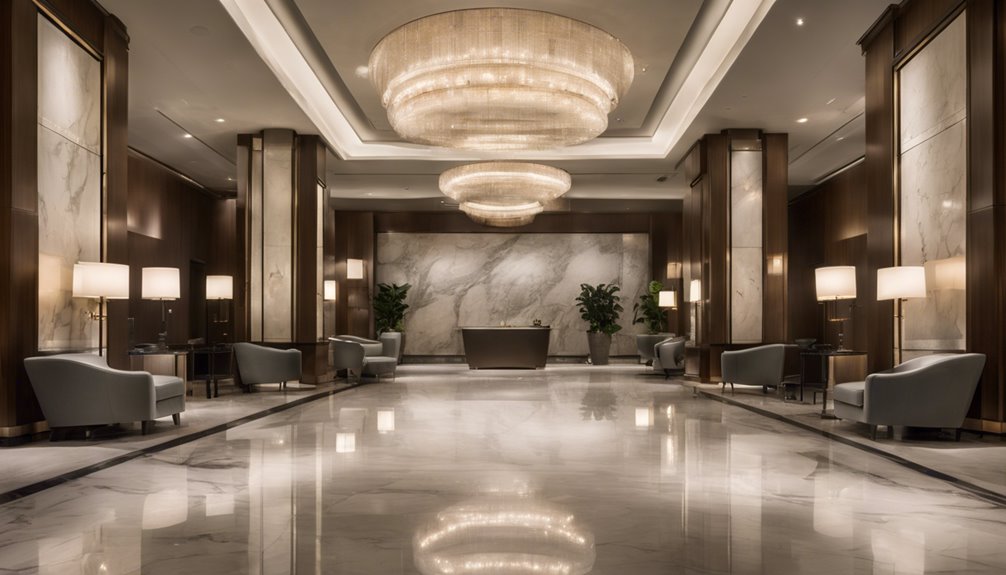Hotels often skip the 13th floor due to widespread superstitions associated with the number. Many cultures view 13 as unlucky, stemming from historical events like the Last Supper and the arrest of the Knights Templar. By omitting this floor, hotels enhance guest comfort and attract superstitious clientele, reinforcing their brand image. This design choice also allows for improved navigation and overall guest satisfaction. Notably, some establishments creatively label the 13th floor differently to sidestep the stigma. If you're curious about how these practices evolve, there's more to uncover about the interplay between superstition and hospitality.
Historical Significance of the Number 13

Throughout history, the number 13 has often been associated with bad luck and superstition, making it a focal point of cultural anxieties. You might've noticed that this "unlucky number" pops up in various historical events, shaping perceptions and practices. For instance, the Last Supper featured 13 individuals, leading to the belief that having 13 guests at a table would invite misfortune. Additionally, the Knights Templar were arrested on Friday the 13th, further cementing this date's ominous reputation. Societies have seen 13 as a harbinger of chaos, influencing everything from architecture to personal choices. This historical significance showcases how deep-rooted these beliefs are, prompting a collective avoidance that still lingers in modern times. The impact of the number 13 is undeniable, shaping our perceptions of luck.
Cultural Superstitions Around the World
When you think about the number 13, it's fascinating how different cultures perceive superstition surrounding it. In some places, it's considered unlucky, while others embrace it as a symbol of good fortune. This global perspective not only influences personal beliefs but also shapes architectural design, leading to decisions like skipping the 13th floor in hotels.
Number 13 Beliefs
Many cultures around the world hold superstitions about the number 13, often linking it to bad luck and misfortune. This unlucky number has deep roots in history; for instance, some believe it stems from the Last Supper, where Judas, the betrayer, was the 13th guest. However, myth debunking reveals that 13 can also signify transformation and renewal in various cultures. In Italy, for example, 13 is viewed as a lucky number, while in some Asian cultures, the number 4 is considered more unfortunate. Understanding these diverse perspectives allows you to challenge the notion of 13 as merely unlucky. By embracing this complexity, you can explore the rich tapestry of beliefs surrounding numbers and their meanings.
Global Perspectives on Superstition
Superstitions vary considerably across cultures, reflecting unique beliefs and values that shape how people perceive luck and misfortune. In some cultures, the number 4 is avoided due to its association with death, while in others, breaking a mirror is seen as a harbinger of bad luck. These cultural beliefs illustrate how global trends influence daily life and decision-making. For instance, in Japan, many hotels skip the 4th floor, much like the 13th floor in Western contexts. This avoidance highlights a collective desire for safety and fortune. By understanding these superstitions, you gain insight into the rich tapestry of human experience, revealing how intertwined our fears and hopes are across different societies.
Architectural Design Considerations
Although cultural beliefs may seem abstract, they profoundly influence architectural design, particularly in regions where certain numbers are deemed unlucky. For instance, the absence of a 13th floor in hotels reflects a keen awareness of architectural symbolism. This design choice isn't just about superstition; it's a strategic move to enhance design aesthetics and attract guests. By omitting the 13th floor, architects aim to create an environment that feels welcoming and free from negative associations. Similarly, in some cultures, the number 4 is avoided due to its connection with death. Understanding these cultural nuances can help you appreciate the thoughtful decisions behind building designs. Ultimately, such choices reveal how deeply rooted beliefs shape our physical surroundings.
Impact on Hotel Design

As hotels aim to create inviting spaces for their guests, the absence of a 13th floor often influences architectural choices and design layouts. This decision impacts various aspects of hotel design, including:
- Floor Numbering: Skipping the 13th floor can simplify navigation for guests, aligning with common perceptions.
- Design Aesthetics: The overall look of the building may shift, as architects find creative ways to maintain balance without the 13th level.
- Guest Amenities: Spaces usually designated for the 13th floor may be reallocated, enhancing amenities on upper floors.
- Structural Considerations: Engineers might adjust load distribution to compensate for the missing floor, ensuring stability.
These elements showcase how superstition subtly shapes hotel design, marrying functionality with a keen awareness of guest sentiment.
Guest Perception and Satisfaction
While many guests may not consciously recognize the absence of a 13th floor, it can subtly influence their overall perception of a hotel. This decision taps into guest psychology, shaping how you feel about your stay. When you check in and notice the missing floor, it may evoke curiosity or even relief, subconsciously enhancing your customer experience. A hotel that prioritizes guest comfort often earns your trust and satisfaction, making you more likely to return. The absence of a 13th floor may seem trivial, but it reflects a deeper understanding of the fears and superstitions many guests harbor. Ultimately, these thoughtful design choices can create a more inviting atmosphere, fostering positive feelings and memorable stays.
Marketing Strategies in Hospitality

When you think about marketing strategies in hospitality, it's crucial to contemplate how superstitions and cultural beliefs can shape guest perceptions. Brands often leverage these insights to enhance their image and differentiate themselves in a competitive market. By understanding these dynamics, you can better appreciate how hotels position themselves to attract and retain guests.
Superstitions and Beliefs
Many hotels strategically avoid labeling a 13th floor due to the widespread superstition surrounding the number, which many associate with bad luck. This practice reflects various superstitious practices and cultural variations, revealing how deeply rooted beliefs can influence marketing strategies.
Here are some common reasons hotels skip the 13th floor:
- Guest Comfort: Many potential guests might feel uneasy staying on the 13th floor.
- Cultural Sensitivity: In some cultures, the number 13 is particularly feared.
- Increased Bookings: Avoiding the number can boost reservations among superstitious clientele.
- Brand Image: Hotels want to maintain a positive perception and avoid any association with misfortune.
Branding and Perception
A significant number of hotels understand that branding and perception play essential roles in attracting and retaining guests. By employing effective branding strategies, hotels create a distinct identity that resonates with their target audience. This identity influences how guests perceive the hotel experience, shaping their expectations and decision-making.
Perception management becomes important in this situation; a hotel might opt to skip the 13th floor to eliminate superstitious concerns, thereby enhancing its overall brand image. This approach demonstrates an awareness of guest sensitivities, fostering trust and comfort. Ultimately, your choice of hotel can be influenced not just by amenities, but by how well a brand communicates and aligns with your values and perceptions, making these strategies essential for success in a competitive industry.
Competitive Market Positioning
Competitive market positioning is essential for hotels aiming to differentiate themselves in a crowded hospitality landscape. To establish a competitive advantage, you'll want to focus on:
- Unique Experiences: Offer tailored services or local partnerships that create memorable guest experiences.
- Target Audience Segmentation: Identify and cater to specific demographics, like eco-conscious travelers or business professionals.
- Brand Storytelling: Share your hotel's history or values to connect emotionally with guests and enhance market differentiation.
- Innovative Technology: Implement user-friendly apps or smart room features that elevate convenience and modern appeal.
Alternatives to the 13th Floor
While some hotels choose to skip the 13th floor entirely, others find creative solutions to navigate this superstition. One popular method is implementing alternative building designs that cleverly reposition the 13th floor within the numbering system. For instance, some hotels label the 12th floor as the 14th, creating a seamless change without invoking fear. Others might use creative numbering systems, such as renaming the 13th floor as "M" for "mystique" or even using themed labels that shift focus away from traditional numbering. These approaches not only address superstitions but also enhance the guest experience by fostering a more positive atmosphere. Ultimately, hotels aim to maintain appeal and occupancy rates while respecting guests' beliefs and preferences.
Changing Attitudes Toward Superstitions

As society evolves, attitudes toward superstitions, like the aversion to the number 13, are gradually shifting. Many people are challenging old beliefs, driven by an increasing desire for freedom from traditional constraints.
Consider these evolving perceptions:
- Cultural Awareness: Understanding that superstitions vary widely across cultures.
- Personal Empowerment: Embracing individuality over collective fears.
- Critical Thinking: Questioning the rationale behind superstitions instead of accepting them blindly.
- Community Influence: Sharing experiences that debunk the myths surrounding numbers.
These changing beliefs reflect a broader trend toward rationality and openness. As you navigate this landscape, you might find that the fear of the number 13 is becoming less relevant, allowing for a more liberating perspective on life and its uncertainties.
Frequently Asked Questions
Do All Hotels Skip the 13TH Floor?
You might think of hotel architecture as a modern marvel, but it often bows to ancient superstitions. Not all hotels skip the 13th floor, but many do due to superstition influence, particularly in cultures where the number 13's deemed unlucky. This choice reflects a desire to create a welcoming atmosphere, avoiding any potential discomfort for guests. While some hotels embrace the number, others play it safe, catering to popular beliefs about luck and misfortune.
What Other Buildings Avoid the Number 13?
You might be surprised to learn that many office buildings and residential complexes also avoid the number 13. This superstition stems from cultural beliefs surrounding bad luck. In places where this fear is prevalent, developers often skip labeling the 13th floor, opting for 14 instead. This practice can extend to apartment numbers, too. Ultimately, it reflects a desire to create environments that feel welcoming, free from the weight of superstition.
Is the Fear of 13 a Psychological Condition?
You might think the fear of 13 is as wild as a lion in a library! This fear, known as triskaidekaphobia, has roots stretching back to ancient cultures, where the number 12 symbolized completeness. Thirteen, breaking that symmetry, gained a negative cultural significance. It's fascinating how this psychological condition manifests in behaviors and beliefs, influencing everything from everyday decisions to architectural choices. Understanding its origins can offer you insight into human nature and societal norms.
How Do Guests React to the Absence of a 13TH Floor?
Guests often perceive the absence of a 13th floor through the lens of superstition beliefs. Some might find it amusing, while others feel a sense of unease, reflecting deeper cultural fears associated with the number. This omission can evoke curiosity or even relief among those who hold superstitions. Ultimately, it's fascinating how a simple architectural choice can influence guest perceptions, shaping their experience in ways they might not even consciously recognize.
Are There Any Hotels That Embrace the 13TH Floor?
Think of the 13th floor as an overlooked gem, often hidden in plain sight. Surprisingly, some hotels embrace this quirky number, viewing it as a unique selling point rather than a superstition. These establishments confidently label their 13th floor, inviting guests to experience the charm of hotel quirks. It can symbolize a break from tradition, offering a sense of freedom for those willing to confront the fears surrounding this often-ignored level.



